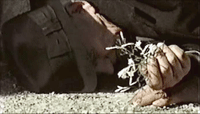Perhaps Francesco Rosi’s most pointed and incisive social examination of the widespread instability, scandal, injustice, and corruption of (then) contemporary postwar politics, Exquisite Corpses opens to the image of a somber, elderly judge named Varga (Charles Vanel) as he walks pensively through the catacombs of a church, observing in painstaking detail the recesses and contours of the rows and rows of mummified corpses that curiously line the eerie, dimly lit passageways before emerging from the church entrance into the sunlight to continue his leisurely, routine morning walk. This silent communion between the judge and the ominous, seemingly endless succession of scattered, mummified corpses appropriately prefigures the evolution of the film’s dark tale of conspiracy and murder as well when, only moments later, Varga is felled by a single rifle shot to the head as he reaches up to pluck a flower from an overgrown courtyard tree. No sooner has Inspector Rogas (Lino Ventura) installed himself within the cadre of pall bearers for Varga’s funeral in order to conduct a low-key surveillance of potential suspects when he learns that a second assassination of a federal judge bearing a similar signature of calculated precision has taken place in another city, an implicit, high profile connection that immediately brings the country teetering ever closer to the brink of instability as word of a serial political assassin working to disrupt the justice system – and ultimately, the very fabric of society’s sense of law and order – begin to grip the nation with inconclusive, often conflicting news of the victims and the progress of the investigation. Operating under a theory that the murders may not be politically motivated, but instead, connected by a personal vendetta carried out by someone who had been jointly prosecuted – perhaps unjustly – by the judges in the same court, Rogas begins to follow a tortuous, often unpredictable trail culled from a list of wrongfully convicted former defendants and exonerated prisoners that would inevitably bring him into the nebulous company of a genial, but politically savvy Security Minister (Fernando Rey) whose insinuation into the company of left-wing political leaders betrays his own unscrupulous ambitions to retain power and weather any potential shifts in the political tide, a potential third target named Judge Rasto (Alain Cuny) who had transcribed some of the proceedings of the trials and now shutters himself in his home in constant fear of the faceless assassin, an enigmatic socialite named Madame Cres (Maria Carta) who may have planted incriminating evidence in order to frame her own husband for her attempted murder, Rogas’ trusted friend and scientist (Paolo Bonacelli) who begins to question the simple motive of vengeance for the murders as the logical realization of a sophisticated, ever widening (and deepening) level of conspiracy becomes increasingly inescapable, an ideologically rigid magistrate (Max von Sydow) who summarily rejects the intrusion of humanity or compassion into the dispensation of the law, even as he arbitrarily breaches it with illegal wiretaps and surveillance of those whom he deems to be a threat to social order. Incorporating familiar elements that have come to define Rosi’s cinema – elliptical narrative, estranged perspective, and illuminating dream sequences – Exquisite Corpses encapsulates the volatile, often incestuous relationships between the government, organized crime, political opposition, religious authorities, radicals, terrorists, and the media that have irreparably shaped the murky, turbulent landscape of 1970s Italian politics, a climate of protracted instability that would culminate with the kidnapping and murder of Italian Prime Minister Aldo Moro by the Red Brigade in 1978 (the subject of Marco Bellocchio’s penetrating docu-fiction, Good Morning Night). In its unflinching depiction of the abuse of power, heavy-handed governance, egregious alliances, and Machiavellian sense of justice and privilege, the film serves as a trenchant, contemporary, and relevant exposition into the ingrained political culture of corruption, arrogance, tenuous ideology, and delusive righteousness.
© Acquarello 2006. All rights reserved.
